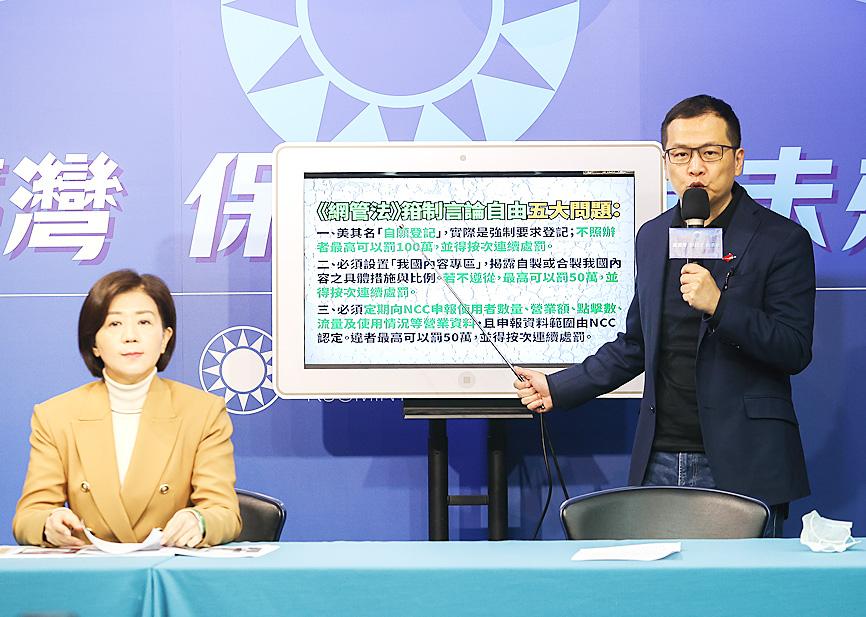The Chinese Nationalist Party (KMT) yesterday accused the government of attempting to control free speech on the Internet with its plans for an over-the-top media services management act.
While the National Communications Commission’s (NCC) draft version of the act would allow over-the-top media service providers to register on what the NCC has described as a “voluntary” basis, under the same act, the agency could also require mandatory registration of providers based on measures such as their number of users, revenue, amount of traffic or market influence, or for some other major public interest, the KMT said.
The draft act proposes a fine of up to NT$1 million (US$35,149) for those who do not register as requested, with the possibility of further fines, the party said.

Photo: CNA
Article 13 of the draft act states that if the NCC determines that a provider’s content is “harming national security,” or “harming public order or good morals,” the provider could be fined up to NT$1 million if corrections are not made within a specified time frame, with the possibility of further fines, the KMT added.
The proposed act would allow the government to “suppress people’s comments on the Internet,” KMT Institute of Revolutionary Practice director and Taipei City Councilor Lo Chih-chiang (羅智強) said at a news conference in Taipei.
The KMT said that if the act proposed by the NCC is implemented, “in the future, there will be no freedom of speech in Taiwan.”
KMT Culture and Communications Committee director-general Alicia Wang (王育敏) said the government should not “test the public’s limits,” as there continues to be some anger about the removal on Saturday of CTi News after the NCC rejected the channel’s application to renew its broadcasting license.
“The anger has turned into support,” she said, citing an increase in subscribers to CTi News’ YouTube channel to more than 2 million.
Instead of reflecting on the public outcry over CTi News, the government is doubling down to “further suppress opinions on the Internet,” she added.
The KMT said that it would try to block the proposed act and it urged people to “come together and help defend the basic value of freedom of speech.”
The NCC also plans to propose a digital communications act which would “expand the scope of the suppression of freedom of speech,” the KMT said.
Accusing the government of wanting to “exclude all dissident voices on the Internet,” the party said that the two proposed acts would be the equivalent of a “digital” version of the authoritarian-era Publication Act (出版法), which suppressed ideas and restricted creative freedom.
Separately yesterday, NCC Chairman Chen Yaw-shyang (陳耀祥) said that the proposed digital communications act would better regulate “inappropriate” content on online platforms and that it would not be used to censor the Internet.
The government would never engage in censorship of the Internet, as it is a free, open and innovative space, Chen said.
The NCC is still drafting the bill and would listen to the views of all parties before presenting its final version to the legislature, he said.
The NCC proposed a similar act in 2018, but the bill was not passed by lawmakers due to concerns over censorship of the Internet.
That bill covered major online social media such as Facebook, YouTube and Instagram, and would have allowed people to report misinformation and fabricated news on an online platform.
Additional reporting by CNA

A preclearance service to facilitate entry for people traveling to select airports in Japan would be available from Thursday next week to Feb. 25 at Taiwan Taoyuan International Airport, Taoyuan International Airport Corp (TIAC) said on Tuesday. The service was first made available to Taiwanese travelers throughout the winter vacation of 2024 and during the Lunar New Year holiday. In addition to flights to the Japanese cities of Hakodate, Asahikawa, Akita, Sendai, Niigata, Okayama, Takamatsu, Kumamoto and Kagoshima, the service would be available to travelers to Kobe and Oita. The service can be accessed by passengers of 15 flight routes operated by

Chinese spouse and influencer Guan Guan’s (關關) residency permit has been revoked for repeatedly posting pro-China videos that threaten national security, the National Immigration Agency confirmed today. Guan Guan has said many controversial statements in her videos posted to Douyin (抖音), including “the red flag will soon be painted all over Taiwan” and “Taiwan is an inseparable part of China,” and expressing hope for expedited reunification. The agency last year received multiple reports alleging that Guan Guan had advocated for armed reunification. After verifying the reports, the agency last month issued a notice requiring her to appear and explain her actions. Guan

GIVE AND TAKE: Blood demand continues to rise each year, while fewer young donors are available due to the nation’s falling birthrate, a doctor said Blood donors can redeem points earned from donations to obtain limited edition Formosan black bear travel mugs, the Kaohsiung Blood Center said yesterday, as it announced a goal of stocking 20,000 units of blood prior to the Lunar New Year. The last month of the lunar year is National Blood Donation Month, when local centers seek to stockpile blood for use during the Lunar New Year holiday. The blood demand in southern Taiwan — including Tainan and Kaohsiung, as well as Chiayi, Pingtung, Penghu and Taitung counties — is about 2,000 units per day, the center said. The donation campaign aims to boost

The Central Weather Administration (CWA) said a magnitude 4.9 earthquake that struck off the coast of eastern Taiwan yesterday was an independent event and part of a stress-adjustment process. The earthquake occurred at 4:47pm, with its epicenter at sea about 45.4km south of Yilan County Hall at a depth of 5.9km, the CWA said. The quake's intensity, which gauges the actual effects of a temblor, was highest in several townships in Yilan and neighboring Hualien County, where it measured 4 on Taiwan's seven-tier intensity scale, the CWA said. Lin Po-yu (林柏佑), a division chief at the CWA's Seismological Center, told a news conference